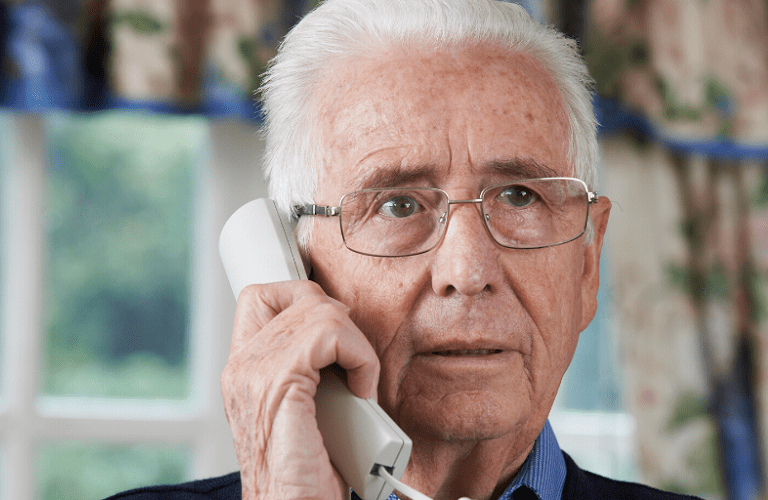
“Our Admiral Nurse initiated a conversation about end of life”
As a palliative care nurse, Jenny reflects on the importance of empathy during end of life care and how her Admiral Nurse helped her family prepare for her Mum's death.

In order to get the most out of telephone or video calls, it’s important to choose a quiet area of the house, and perhaps you may like to trial how the person with dementia interacts with the technology. Telephone calls or video calls aren’t suitable for everyone so it’s fine for you to look at alternative options for a family member. Telephone calls may be more beneficial if the person with dementia is still at quite early stages of the condition, whilst video calls can be a great way to see each other again and maybe flick through photo albums if other avenues of communication have been lost. You could even try and share the call with a grandchild or another family member.
Telephone calls can bring a number of challenges, especially as people cannot see a person’s body language to gauge what someone may be feeling or finding difficult to verbalise. However there are a number of things you can bear in mind:
You can have a look through Tips for Better Communication, which contains a number of suggestions which are useful for telephone conversations. This can include speaking slowly, clearly and in short sentences, giving them more time to answer as well as avoiding asking open-ended questions which can be a challenge for people with dementia.
Be more conscious of cues, for example, if someone says they feel worried, you could say: “What is worrying you right now?”
Remember that people with dementia need more time in conversations. There are always natural pauses, but be more aware of these during a telephone call and remember to ask how the person is feeling regularly.
Make sure you have understood what they’ve said by reflecting, or mirroring what they have said, for example, if they say “I’m worried about what’s going to happen next,” you could say, “What do you think is going to happen next? I can see that you are worried about something – can you tell me what you are worried about?” They will appreciate you listening, and the valuable reflection of their thoughts.
At the end of the telephone conversation, you could agree to set a day and time to call again soon. The person with dementia could write the date and time on a calendar so they have something to look forward to. Reminder alerts could also be set up on phones or other devices.
Whilst you can use some of the tips above for video calls (especially giving people with dementia more time), there are other things you might want to bear in mind here as this new technology can be confusing for some. It’s important to get the basics right, particularly as people with dementia can experience changes in perception as well as confusion.
Ideally, position yourself and your device at a desk or table and consider the lighting to ensure the person can see you well. For example, do not sit in front of a window, as the backlight will make it difficult for others to see your face and expressions. Sit at eye level to the camera, and try to position yourself so that it shows your upper body and head. Placing the camera too high leaves the person with dementia staring down at you, too low and it may appear to them that you are looking down on them and possibly make them feel intimidated.
Similarly, you need to concentrate on the video screen otherwise you might give the impression that you are not paying attention or seem aloof, which may be distressing for a person with dementia. Looking into the camera lens is the equivalent of looking into the person’s eyes; you may want to practice how you come across with another family member so you’re comfortable with it.
Minimise other potential distractions for you and the person with dementia, for example, turn off your TV (even a mute screen can distract you), turn off any background music, log out of any open windows on a computer, such as email, social media, or any apps that may send you ‘ping’–type notifications. Don’t forget, the person with dementia may hear these things but not know where they are coming from. Importantly, set your phone to ‘Do Not Disturb’ or turn off your ringtone. Best of all would be to turn it fully off so you can fully concentrate on talking to your loved one with dementia and vice versa, giving them the attention they need and deserve.
When setting up the calls, make sure your appearance is as familiar as possible for the person with dementia, otherwise it may cause concern for them or a failure to recognise you. Wearing your hair up or down if this is something you usually do can limit the risk of this happening.
You could also put some familiar photographs of family members or family events behind you to help with reminiscence. Setting aside some time to sing a favourite piece of music together or putting on a recording can further help to stimulate the person and help with valuable feelings of connection.
You may however find that neither of the above options are suitable for either your needs or your family member’; the person could struggle and may find it difficult to understand the technology. In this case, it may be a good idea to send postcards or letters on a frequent basis, or even a postal package with items which are meaningful to the person and include a letter.
Our virtual clinics give you the chance to discuss any questions or concerns with a dementia specialist Admiral Nurse by phone or video call, at a time that suits you.

As a palliative care nurse, Jenny reflects on the importance of empathy during end of life care and how her Admiral Nurse helped her family prepare for her Mum's death.

When Rosie’s mum, Dawnie, was diagnosed with young onset Alzheimer’s disease, her employer ensured caring responsibilities were fully supported.

Glenn shares how flexible working arrangements and support from his managers enables him to continue working whilst prioritising his wife Helen's care.